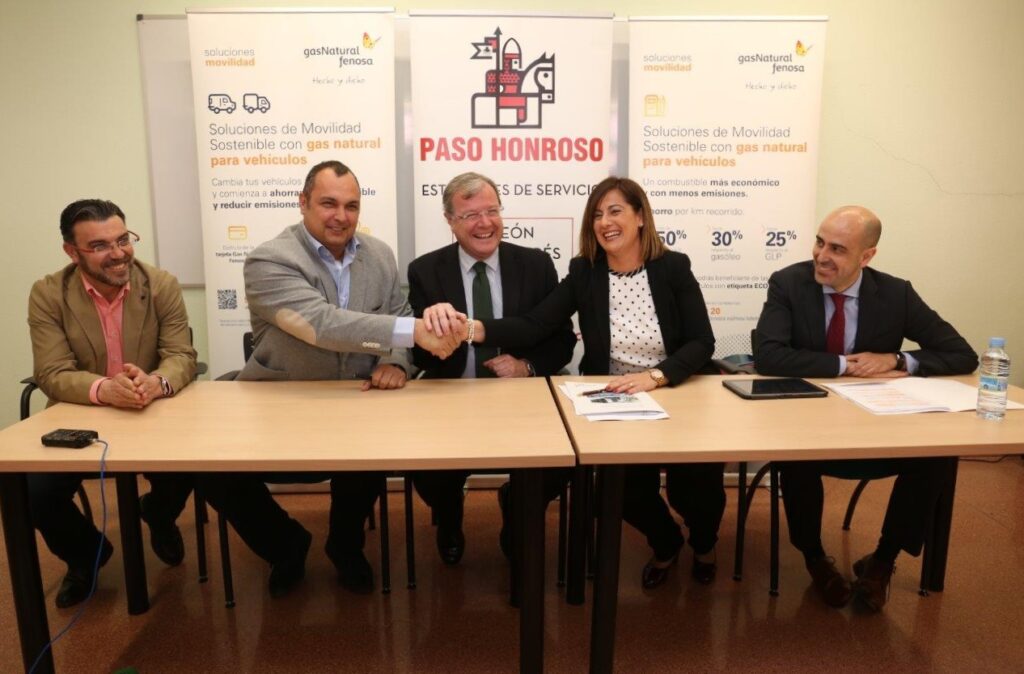The Central-North Zone Delegate for the Commercialisation of Energy Solutions at Gas Natural Servicios, Mª Francisca Rodríguez, and the Managing Director of Paso Honroso, José Pedro Luengo, signed a contract this morning to build the first public compressed natural gas service station for the distribution network in Castile-Leon.
The gas service station will be located at the Paso Honroso station at Mercaleón, a highly strategic location given its significant goods traffic, vicinity to the city centre and connection to one of the city’s main roads.
The presentation event was supported by the Mayor of Leon, Antonio Silván, the Councillor for Trade and Consumer Affairs, Pedro Llamas, the Delegate for Large-Scale Consumption and Infrastructures in the North at Nedgia, a distribution company of GAS NATURAL FENOSA, whose networks will supply the gas to this service station, Javier de Celis and the Manager of Mercaleón, Carlos Javier Suárez.
At present, vehicular natural gas (VNG) supposes a real, sustainable and affordable alternative to traditional fuels for transport, including private, freight and light vehicles. All kinds of vehicles can run on natural gas: cars, vans, buses, heavy lorries and trains are already using this fuel. The 18 million natural gas vehicles in the world demonstrate its technical feasibility, it being the most efficient and sustainable form of energy as it offers an important balance of economic and environmental benefits by reducing emissions and generating less noise pollution.
In 2017, the registration of new vehicles and lorries running on natural gas increased by 112% in Spain, thus guaranteeing the use of this fuel in a country that already has a fleet of 8,700 vehicles consuming an average of 2,682 GWh/year, according to data from GASNAM (the Iberian Association for Gas-Powered Mobility).
Vehicular natural gas replaced 142,000 toe (tonnes of oil equivalent) in Spain during 2016; it being the alternative fuel that has replaced the most tonnes of oil. The largest fleet of buses in Spain (the fleet owned by EMT in Madrid) has been committed to this energy as an alternative to diesel for years.
Sustainability and affordability
Vehicular natural gas improves air quality in cities due to its zero emissions of NO2 and PM10 solid particles, the main cause of respiratory problems stemming from urban pollution. Furthermore, it reduces the carbon dioxide emissions by 30% and emits zero sulphur dioxide.
In terms of noise pollution, vehicles running on natural gas produce 50% less noise and vibrations than those running on diesel. This factor is especially important for fleets that operate at night, such as rubbish trucks.
Vehicles that use this fuel bear the ECO label by the Spanish Directorate-General of Traffic (DGT), allowing them to enjoy benefits including freedom of access to city centres at times when air pollution levels are high, as well as tax incentives and tax credits in regulated parking areas, among others.
Furthermore, the use of vehicular natural gas as a fuel represents a significant saving for users. Filling a tank of natural gas is 50% cheaper than refuelling with petrol and 30% more economical than diesel.
Operations in Castile-Leon
Among other businesses, GAS NATURAL FENOSA operates in the region through Nedgia Castilla y León, a company that distributes natural gas to over 440,000 supply points in almost 120 municipalities via a transportation and distribution network measuring more than 4,200 kilometres and enables over half a million properties and businesses to receive heating and hot water services in their homes and industries.
The distribution company is working on the development of vehicular natural gas infrastructures in Castile-Leon. There are another two public service stations in the region, located in the province of Burgos. One of them is shared with GAS NATURAL FENOSA. Furthermore, a small service station is operating at the installations of the Ente Regional de la Energía (EREN) of Castile-Leon to provide fuel to the CNG vehicles owned by this public authority.
As regards the development of urban natural gas fleets, the local council authorities of Salamanca and Burgos have been committed to vehicular natural gas for its urban bus and rubbish trucks for years (Salamanca). Recently, the two local authorities added 11 new CNG buses to their fleets in order to improve air quality in their cities, raising the number of urban buses running on this sustainable fuel to 57. Other local council authorities in the region are developing projects to add CNG vehicles to their environments.
